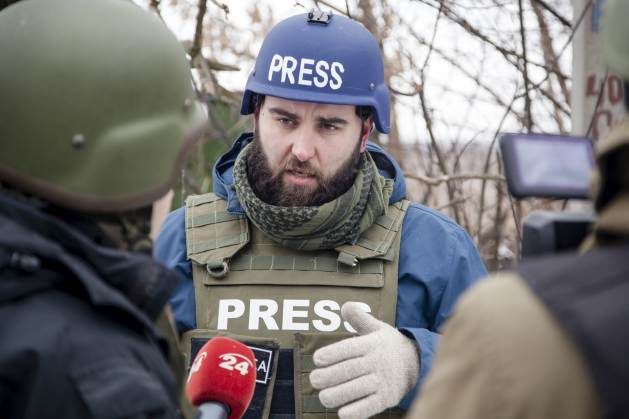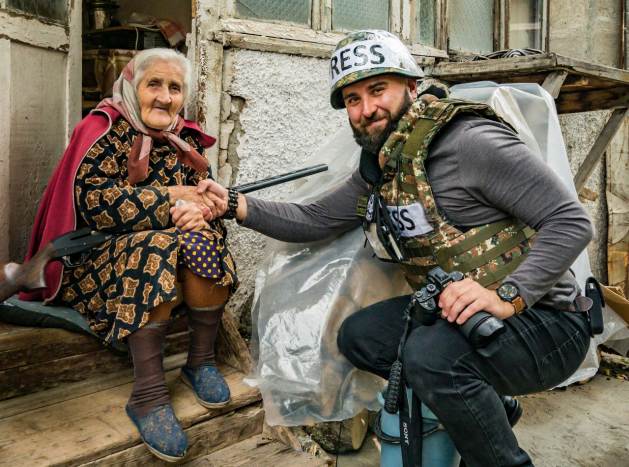The Journalist Stranded in Europe’s “Guantánamo”

NABARNIZ, Spain, Jan 19 (IPS) - It's 23 hours a day in a cell without natural light and just one to walk around in a 7x4-metre courtyard. For Pablo González, an independent Spanish-Russian journalist, it's been almost a year spent in solitary confinement in Poland.
González was arrested on the night of February 27th in Przemysl, a Polish city bordering Ukraine. A journalist specializing in the post-Soviet space, the reporter had worked in Ukraine several times and he was planning to cross the border to cover the Russian invasion of the country launched a few days before.
Three days after his arrest, the Polish government released a statement that the Internal Security Agency (ABW) had arrested González "on suspicion of having carried out operations for the benefit of Russia, taking advantage of his status as a journalist."
“They said they had 'irrefutable proof' that he is a spy, but no one has yet seen it. The secrecy around it is overwhelming,” Oihana Goiriena, González's partner, told IPS from her residence in Nabarniz, in Spain’s Basque Country.
Following the latest three-month extension granted by the court handling the case, Polish authorities still have not made public the evidence they claim to have against the journalist. His lawyers in Poland are not allowed to speak publicly about the case, there is no date for the trial and not even a formal accusation against González.
“He has lost a lot of weight, but the worst thing for him is being in solitary confinement, not being able to talk to anyone all day,” explains 47-year-old Goiriena. She was able to visit him on November 21 of last year. A Polish security agent supervised the reunion, for which Goiriena travelled to Poland.
González is prevented from making telephone calls and has to rely on letters to communicate with the outside world. The letters need to be translated and filtered by Polish security first, however, and replies can take four months. "Two for the letters to reach him and another two to receive his," says Goiriena. As for her three children, "they have not seen their father in all this time."
Goiriena describes the Spanish Government’s response to the case as "tepid."
"So far we have only had contact with the Spanish consul in Warsaw, no one else has reassured us or shared any hints," she says.
The reason González has been dragged to the Polish cell remains vague, she says. Goiriena believes her partner’s two passports, Russian and Spanish, set off alarm bells in Warsaw.
The son of a Russian and the grandson of an exile from the Spanish Civil War, Pablo González was born in Moscow in 1982 as Pavel Rubtsov. When his parents split eight years later, the child was left in the custody of his mother -the granddaughter of another Spanish exile- who returned to Spain and registered her school-age son as Pablo, the Spanish translation of Pavel, and under her last name, González.
Alternatively, Goiriena says her partner’s reporting might have also caught Polish officials’ attention. "Pablo had previously worked a lot in Poland, covering stories such as the anti-government protests, the threats faced by the LGTBI community or the migratory crisis on the Belarusian border, where people were left to die in the cold in the "no man's" land between both countries,” she says..
“He is an ‘uncomfortable’ journalist,” for Polish officials, she says. “I think they went too far and now they don't know how to get out of this."

Administrative silence
A Polish lawyer was hired in April 2022, and Goiriena sought advice from a criminal justice panel in the country last October. González's primary lawyer since he was arrested, though, has been Gonzalo Boye.
A Chilean based in Spain for over three decades, Boye is an expert in European International Law who has been involved in several high-profile cases including the March 11, 2004 jihadist bombing of Madrid’s Atocha train station, and Edward Snowden´s whistleblower case, among others.
Speaking to IPS by phone from Madrid, he said González’s arrest is “unprecedented” within the European Union. “It is an unsustainable case, one of those in which someone is arrested and later investigated.” Boye has not yet been allowed to visit his client.
"Neither Brussels nor Madrid have lifted a finger, their only answer so far has been silence," says Boye. Claiming institutional indifference to what he describes as "a kind of Guantánamo within the European Union," he has already forwarded a protection request to the UN Working Group on Arbitrary Detentions.
“Europe has sided squarely with Ukraine, and Poland is key in the conflict. Pablo González is just another victim of that war,” argues Boye, in an attempt to find a logic to González´s arrest in Poland.
Alongside a platform that struggles to make the case visible, several personalities and professionals in communication and law have requested Spain’s Ministry of Foreign Affairs of Spain for greater involvement in its resolution.
In a reply to repeated efforts at contact from IPS, Spain’s Ministry of External Affairs stated by email that Spain’s embassy in Warsaw “is up to date on the case and following it closely.”
The statement says González has been offered an opportunity for consular assistance, and received seven visits, with “the next expected soon.”
"At all times, the need to respect their rights has been stressed to Polish authorities. In addition, efforts have been made at different levels in relation to his case, conveying the same message," the ministry said, in its statement.
The Damages
The war in Ukraine has turned Poland into a main hub for supplies of all sorts in Ukraine - from basic food items to hit-tech weaponry -, as well as the main exit point for millions of refugees fleeing the war. It is the focal country in a conflict whose consequences are felt globally.
Poland’s role in the conflict, however, has not prevented the progressive deterioration of its democracy.
In its 2022 report, the US NGO Freedom House claimed that Poland had the fastest decline in democracy among the 29 countries in Central and Eastern Europe and Central Asia monitored by the organization.
“I don't recall a case similar to that of Pablo González in the European Union,” Alfonso Bauluz, the president of Reporters Without Borders in Spain told IPS over the phone from Madrid.
While he pointed to the "complicated scenario" posed by the war in Ukraine, he also highlighted that Poland is "one of those EU countries that have toughened measures against plurality of information."
“For Poland, it´s already been eight years of consecutive decline in the World's Press Freedom Index we release at RSF,” stresses Bauluz. The eastern European country ranks 66th (just behind Cyprus, Mauritius and Montenegro) on a list of 180 countries.
On January 10, RSF Spain called again for the "end of the prison cruelty inflicted on Pablo González,” that his presumption of innocence be respected and that "all the guarantees for a fair trial" are met.
"All I want is a trial as soon as possible, either public or private, but as soon as possible," says Oihana Goiriena. Although the journalist's partner is confident that his innocence will finally be proven and he will be released, she also stresses that the damage has already been done:
“In a few weeks, he will have served a year in prison. In addition, paying lawyers and costs has put us in debt for a long time, not to mention the professional damage it entails for a journalist specializing in the post-Soviet space”.
© Inter Press Service (2023) — All Rights Reserved. Original source: Inter Press Service
 Global Issues
Global Issues